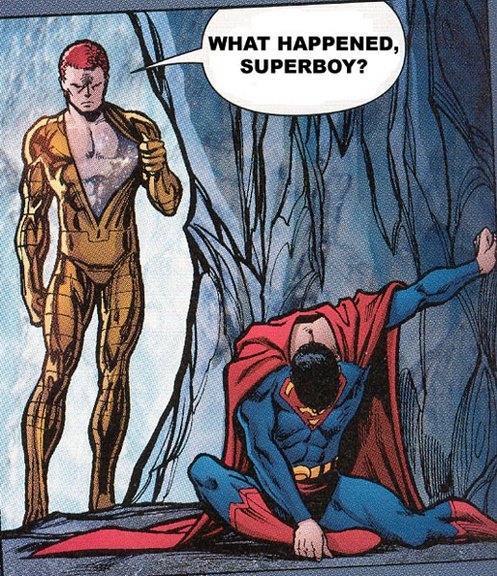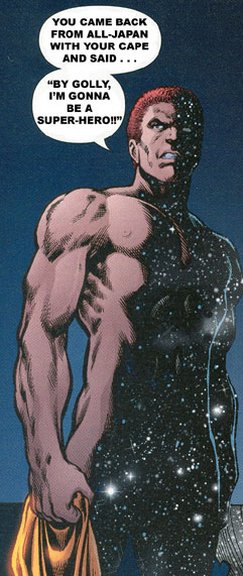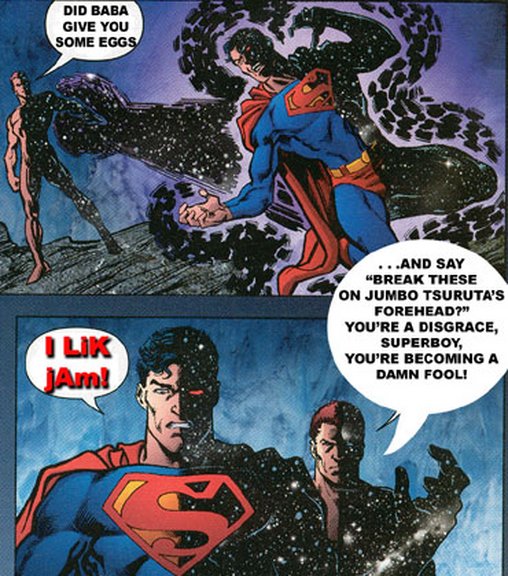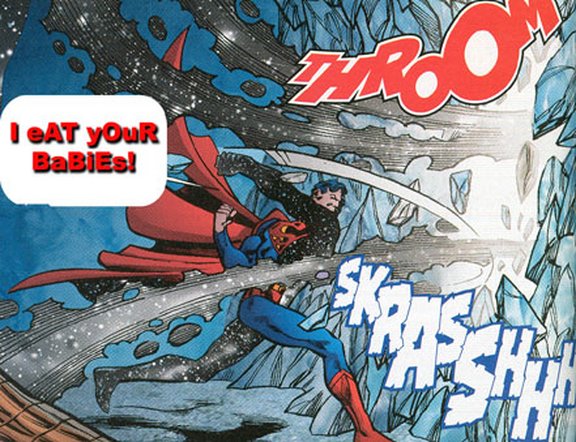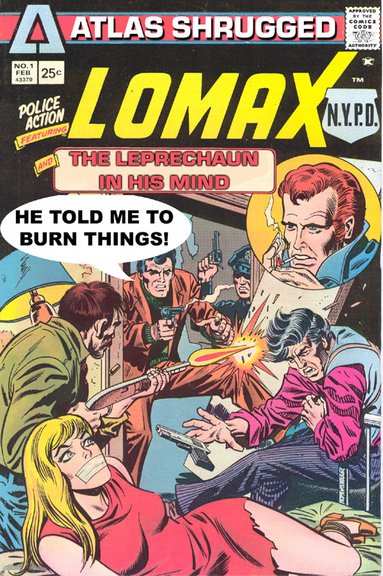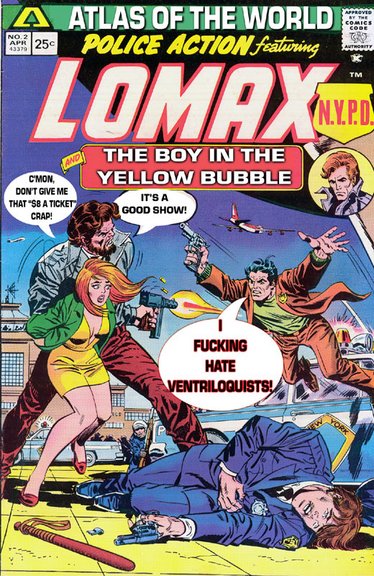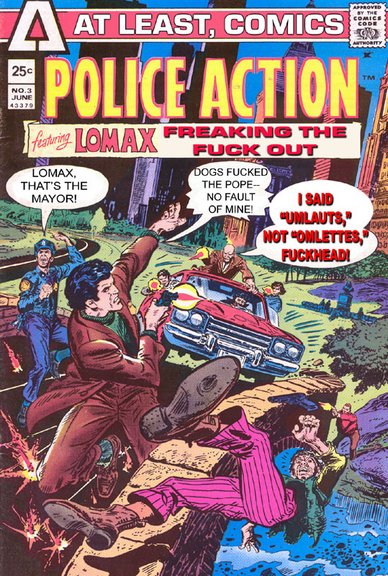So, I ran across this recently, and well, it's a
doozy. This is the long-rumoured
"Superman 2000" proposall from Mark
Waid, Mark
Millar, Tom
Peyer, and Grant Morrison. Like
Twilight of the Superheroes, it's gotten a reputation as being this lost work of genius, mostly from those on the
blogosphere who've read it an analyzed it.
Also, like
Twilight of the Superheroes, it's the most brilliant thing you've ever seen until you actually
read it. Once you have, the
absolute utter wrong-
headedness of it will turn you off with so much force you will spin into the Earth like a drill.
I know the standard line on Grant Morrison is that everything he touches erupts in rainbows and turns to gold, but . . .not this. This proposal is completely retrogressive and seems designed to deliberately turn off everything but the most die-hard Superman obsessives. It's staggering to me just how much wrong there is in this thing.
I won't go into it in detail on this--it's linked above if you want to read the whole thing. And there are a number of things I rather liked in the proposal. But, rather than dwell on that I will just cover the big things that stick out at me as wrong:
"Superman is an alien and should act as such"--Around the time of Man of Steel, the fashion among Superman writers seemed to be an inversion of the conventional wisdom about Batman. As Batman was the "real" persona and Bruce Wayne was the facade, Superman was the facade--Clark Kent was the "real" person.
It made a certain amount of sense. As one of the big complaints about the
pre-Crisis Superman was that his ridiculous power-level made h
im impossible to relate to at any level and there was no inherent jeopardy in the stories--Superman was so ridiculously powerful the only question about him winning was "how, exactly?"
That's not exactly what the S200 guys propose--they want to make Superman a
figure to aspire to but remote from the people he rescues. It's one way to do it, I suppose, but there's a rather large problem that would probably result in them ending up in the exact same place.
It's very hard to write "alien" perceptions. It usually involves so much textual heavy lifting the mere act of describing unusual perception usually ends up dominating the story. That's not to say it should be off the table, but I can't see that in trying to push that as the new
status quo you're not left with an utterly aloof protagonist who the writers are falling all over themselves trying to hammer home just how different he is and did we mention that as an alien, he perceives the world in a different way than you do?
I could see that getting real old, real fast. And FYI--to mention the "Superman/Christ parallels" at all is to be heavy-handed about it. It's really something that should be set aside on the scrapheap of really pompous and dopey notions that end up in comics because they weren't purged in English Comp 101 like the rest of us.
"Superman should be a vegetarian because he grew up on a farm and is aware and attuned to all life"--
Uhm, "No," and "who cares, really?" If he's attuned to all life, why would he eat plants, then? Aren't plants alive?
Never mind that even they don't seem all that wedded to it as a story-point. Really, if one of your Big Ideas is the Secret Origin of Superman's Sunday Lunch,
everyone's better off that you didn't get a shot and bored the living hell out of a bunch of readers with pompous
didacticism.
I'm not anti-vegan or anti-vegetarian, mind . . .I just don't see how this
necessarily gets us a better Superman. Like . . .at
all. "Clark Kent Goes Back To Being The Daily Planet's Butt Monkey"--It doesn't
necessarily fill me with confidence in your Big Ideas if you say "Man, you know what I miss from the old Superman stories? Steve Lombard trying to prank Clark Kent and it backfiring on him."
I always thought that was really stupid actually. I didn't miss it when they stopped doing it, and I wasn't eager to see it again. I find it amusing that creators seem to think a
superheroic alter ego is only
relatable if he's a complete loser and a figure of ridicule.
It may be, guys--just consider this, OK?--that this sort of thing worked fine when comics had a much less regular audience who only picked up the book intermittently. Now that the audience consist almost entirely of asexual readers in their mid-30s who read every issue even if they hate it and view social interactions the way Frankenstein's Monster viewed fire, they've probably well and truly burnt out on that now.
It's just not the mid-60's anymore guys. If a return the the Daily Planet is what you want, rather than dredging
embarrassing artifacts from the past, maybe you could craft a somewhat more plausible office culture? I mean, most of us have actually
worked in them, now . . .
And finally . . .
"Superman Isn't As Relatable To Me Now That He's Married To A Girl And Thus, This Must Be Immediately Rescinded."--
Hoo boy.
OK, the people who say, as they did with Spider-Man, that marrying the characters off changes the status
quo dramatically have a point. That they say it ages the characters also has a point. That they say that a divorce would age the characters even more also have a point.
That this then validates extreme measures to roll things back to the
status quo ante is absolutely, positively, wrong. If marriage is such a terrible thing, then the answer is not to let the characters marry, ever.
Because there's no getting the toothpaste back in the tube that isn't annoying, off-putting, and immediately suspect.The S2000 guys do go into a lot of lip service about "we have to give the marriage our best shot before we reverse it," but it's clear that's pretty much a lie--writers who had an open mind about playing the hand they're dealt wouldn't have an intricate (I would say "tortured") plot to undo the marriage ready to go if they didn't want it gone.
Their rationale for this, of course, is "we need to bring back the Clark/Superman/Lois" love triangle, probably because it's "another cornerstone of the Superman
mythos."
Well, maybe back then, but like Steve Lombard, what works with an irregular readership doesn't
necessarily work with a rather committed readership. The triangle works as a gimmick in a film, or a TV series, but in an ongoing series, the following question will inevitably turn up:
"How can she be the world's most brilliant reporter and yet be too stupid to figure out he's the same guy, he's just not wearing glasses now?"
And what does that do, except pull down the whole
triangle? If she's too stupid to bother with, her credibility's shot, so why should Superman bother with her? Or Superman's a sadist who just enjoys screwing with her mind, and what the hell is that about?
And how is any of that better or more "daring" that what we get now? That's not to say current Superman comics are any good (they aren't) but I don't really see that the solution is to roll everything back to the Mort
Weisinger era is the solution.
What I do see it as is yet another group of creators who, displeased that the
status quo they remember has been supplanted by another one that doesn't sit as well with them, and rather than do what they would expect others to do ("Just
pretend the stupid marriage didn't happen!")--accept things As They Would Have Them--the wanted to ramrod through what amounts to retrograde motion.
It all sounds
terribly familiar. It's been my position since I started this blog, that ultimately, every generation should be allowed to form their own relationship with these now-iconic characters with as little influence and pressure from previous generations as possible. Needless to say, forcing things back into a tiny little box from the past isn't exactly in keeping with my overall thesis.
